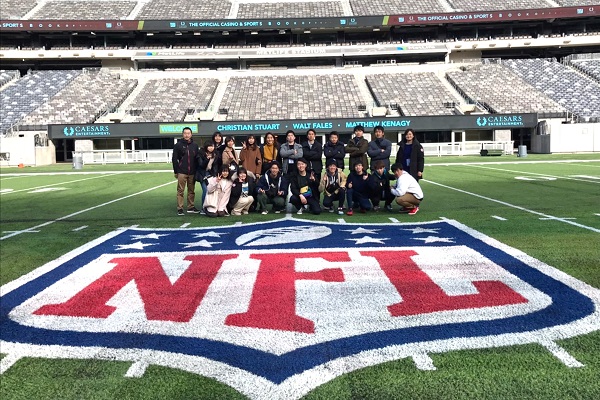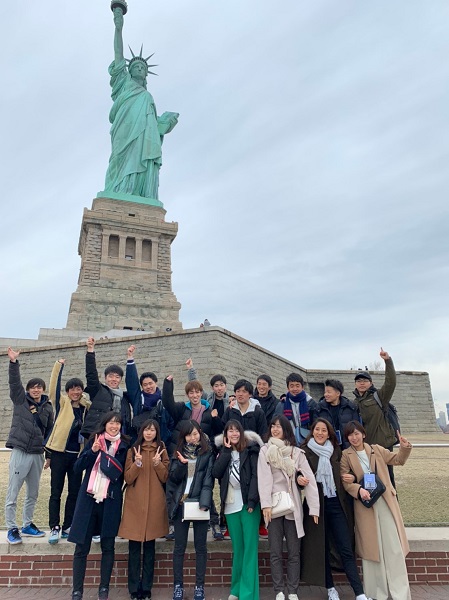Notices
Contributing to the development of sports by mastering sports management (Associate Professor YOSHIDA Masayuki, Department of Sports and Health Studies Sports Department of Sports and Health StudiesFaculty of Sports and Health Studies )
- Jun 28, 2021
Associate Professor Masayuki Yoshida Department of Sports and Health StudiesFaculty of Sports and Health Studies
Associate Professor YOSHIDA Masayuki
Associate Professor Masayuki Yoshida studied sports management in the United States and has received international recognition, including a Research Fellow Award from a local academic society. He is expanding his research on the happiness that sports spectating brings.

Watching Sports at the Venue Enhances Well-Being
Specializing in sports management, he continues his research on sports marketing and sports consumer behavior theory. My current theme is "Sports Spectating and Sustainable Well-being (Well-being)". I am exploring the relationship between the two.
Well-being is a concept that refers to a state of physical, mental, and social well-being. It is a state of harmony among these three elements: good health, good feelings, and good relationships.
Sports have the power to attract people and have many fans. If this is the case, then we can contribute to wellbeing by watching sports. I would like to confirm this causal relationship.
We conducted research and verification focusing on professional baseball and professional soccer (J-League), which are very popular in Japan and have high attendance, and found that "going to the field" is important in order to gain wellbeing from watching sports.
It takes time, effort, and energy to travel to a ballpark or stadium to watch a game. The excitement of the game also increases the amount of activity, such as shouting and clapping your hands. Such physical stimulation generates vitality. Furthermore, since there are many people in the venue, fans feel a sense of unity and bonding with other fans, which improves their social wellbeing. We believe that these synergistic effects enhance well-being.
The current Corona disaster is attracting attention to a new style of spectating, in which the venue will be spectator-free to avoid hermetically sealed, dense, and close quarters, and people will be able to watch and cheer the matches via live streaming over the network. However, I am also concerned that this will become the norm. While the convenience of being able to watch sports from anywhere, it is not enough in terms of improving physical wellbeing. While remote viewing may provide mental satisfaction, it does not match the physical and social satisfaction of stadium viewing. In this sense, I hope that the new Corona will come to an end and that the days when we can go to venues and enjoy sports games without restrictions will return.
-

Photo 1
-

Photo 2
- Students visit MetLife Stadium to learn about the real professional sports business in the U.S. during the Overseas Training Program in Sports Business.
- Students exchange opinions in front of the Statue of Liberty during the Overseas Exercise in Sports Business, considering the meaning of " Practical Wisdom for Freedom.
Achieving a Harmonious Balance between Sports and Business
The 1984 Los Angeles Olympics are called the origin of the "commercial Olympics," and it was a major turning point for the sports world. In order to break out of the crisis of operating the Olympics, which had been continuously in the red, the Olympics entered an era in which sports were managed as a business, and interest in sports management was concentrated. The development of experts and an academic system became an urgent need, and the North American Society of Sport Management was established in 1985. Research on sports management flourished in North America and elsewhere.
If the period of the dawn of the sport management industry is called "Sport Management 1.0," then we are now at the second turning point in the sport management field.
The first turning point, "Sports Management 2.0," occurred in the 1990s, when sports became more professionalized and marketing techniques were incorporated into sports management in order to obtain operational funds. In Japan, the J-League was established and soccer as a professional sport attracted a lot of attention.
Today, we are in "Sports Management 3.0," a period of social change. The logic of business, which seeks profit, and the logic of sports culture, which emphasizes the spirit of fair play and the personal development of athletes, are in conflict with each other and sometimes cause distortion. Without a business perspective, sports would not develop, but if the focus is too much on business, the rules and management methods will be changed unfairly and people will rebel. I believe that the challenge is to find the right balance and harmonize the two.
I want you to develop yourself by stepping into a different world
As a researcher, I want to be up to international standards, and my dedication to my research has made it possible for me to receive a Research Fellowship from the North American Society of Sport Management in 2019. The knowledge, skills, and abilities in sports that I have accumulated in this way. As an educator, I would like to do my best to pass on this " Practical wisdom " to my students.
Looking back, I feel that my study abroad experience was very useful for my personal growth. The world is a big place, full of opportunities to come into contact with diverse values and nationalities. By overcoming inconveniences and difficulties, one's own potential can be enhanced. I hope that students will broaden their horizons by stepping into a different world at least once when the situation settles down and they can freely travel abroad.

-
The 2019 Research Fellow Award ceremony of the North American Society of Sport Management (front row, third from left). Upon receiving the award, he was also elected to the journal's editorial board.
(First published in the June/July 2021 issue of Hosei, a public relations magazine)
Department of Sports and Health StudiesFaculty of Sports and Health Studies Hosei University
Associate Professor YOSHIDA Masayuki ida
Born in Niigata Prefecture in 1979. Graduated from the University of Tsukuba, School of Physical Education, and completed the master's course at the same university. D. in Sport Management from Florida State University, USA. D. in Sport Management from Florida State University. After serving as a full-time lecturer and associate professor at Biwako Seikei Sport University, he became an associate professor at Hosei University's Faculty of Sports and Health Studies in 2017, where he is a member of the editorial board of the Journal of Sport Management, a Trustee Japan Society of Sport Management, and chair of the Mizuno Sports Foundation Research Grant and Selection Committee for Sport Studies and Others. He is a member of the editorial board of the Journal of Sport Management, a member of the board of directors of the Japan Society of Sport Management, and the chairperson of the selection committee for the Mizuno Sports Promotion Foundation's Research Grant for Sport Studies.

